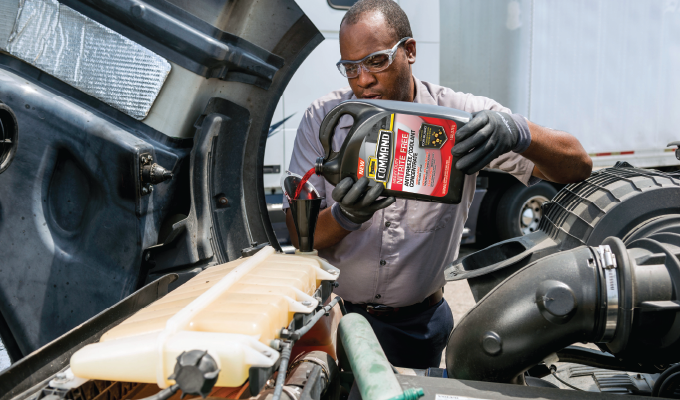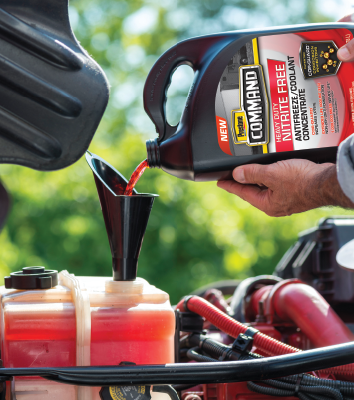By Colin Dilley
For some automobile drivers, a vehicle is just a means to an end, nothing more than a convenient way to get from Point A to Point B. On the other hand, heavy-duty truck fleet managers are passionate about their vehicles, and most have a depth of operational knowledge that could rival that of a world-class Formula 1 or NASCAR crew chiefs. Like crew chiefs, fleet managers are professionals who are intimately familiar with and committed to providing the optimum level of care for the tools of their trade. While many car drivers may ignore that flashing “check engine” light for weeks or get an oil change when convenient, fleet managers take great pains to ensure that all of their vehicle’s systems are operating in tip-top shape before ever hitting the road.
While fleet managers make every effort to ensure their vehicles are road-ready before leaving the yard, their ability to do so has gotten much more complex in recent years—especially if the vehicle’s cooling system is using a traditional Nitrated Organic Acid Technology (NOAT) antifreeze/coolant (AF/C). There are features of the new engines—for example, the controlled atmosphere brazing (CAB) manufacturing method, increased use of lighter aluminum components, and higher operating temperatures—that can compromise the performance of NOAT AF/Cs.
The result of this is that, according to market research by the American Trucking Association’s Technology & Maintenance Council along with FleetNet America, as much as 40% of today’s diesel-engine problems emanate from a malfunctioning cooling system. A truck that is idled can cost the operator as much as $4,000 a day in lost revenue, a total that rises dramatically if a number of trucks are kept off the road due to cooling system damage.
NEW PROCESS
Approximately 15 years ago, engineers began using new materials in the design and manufacture of diesel engine cooling systems, most notably in Class 7 and 8 trucks. Aluminum alloys and reinforced plastics replaced traditional cast iron, copper, and brass to reduce weight, increase miles per gallon, and decrease emissions. While lighter aluminum adds benefits for the fleet operator compared to heavier, legacy engines, the new cooling systems, if not protected correctly, are more prone to suffering from various forms of corrosion, heat stress, damage, and electrolysis.
New processes of joining aluminum components together introduced new solders, fluxes, and elastomers that can react with NOAT coolants, causing localized hot spots. Even small amounts of flux left behind on the aluminum component surfaces by the CAB manufacturing method can react adversely with the inhibitors in traditional nitrite-based AF/Cs. These reactions can change the coolant’s pH resulting in corrosion, plugged filters, coated heat exchangers, and scale buildup on cylinder liners. These reactions retain heat with upwards of a 40% reduction in the cooling system’s ability to cool the engine to its optimum temperature, resulting in lower oil viscosity, reduced mpg, increased emissions, and engine wear—ultimately negating the intended benefits of these modern, lighter engines.
While cooling system capacities continue to get smaller in the search for reduced weight and higher mpg, they are asked to work harder. All in all, the tolerances for operational optimization have significantly reduced, making the ability to remove heat from the lighter, but more powerful engines even more critical. Therefore, selecting the proper AF/C is more important than ever if next-generation heavy-duty engines are to operate at their optimum and reliable best.
NEW SOLUTION
One proven solution is the formulation of Nitrite-Free Organic Acid Technology (NF OAT) AF/C with an inhibitor package designed for these new engines. The inhibitor additives are designed to protect the cooling system from corrosion, gunk, and grime while also eliminating the negative effects of the CAB manufacturing process. The balance of inhibitors enable the NF OAT AF/C to instantly bond to the cooling system components, significantly lowering or eliminating surface-area corrosion and erosion when compared to nitrite-heavy AF/C fluids.
One example of a new inhibitor formulation is the Cor-Guard® inhibitor technology found in Prestone® Command® AF/C. The Cor-Guard inhibitor bonds to cooling system components immediately, which provides the ability to prevent the hot spots that can result from corrosion and scale buildup. This also improves the service life of seals and gaskets, which allows for implementation of a preventive maintenance schedule that can include service intervals of up to 1 million miles or 20,000 hours of operation.
Other benefits of NF OAT AF/C with the new inhibitor additives are:
- Improved AF/C formula stability for optimized overall performance;
- Cooler operation for preservation of oil viscosity, which improves engine life and performance; and
- Improved coolant stability for older AF/C that is topped off with the new formulation, with NF OAT AF/C able to be added to systems operating with NOAT.
A key to keeping all classes of trucks operating effectively and efficiently is to identify and implement an AF/C technology that is compatible with today’s new smaller and lighter but hotter heavy-duty engines. That’s why savvy fleet managers must take every precaution to ensure that when their rolling stock hits the streets, it is in the best working condition possible. That means a cooling system operating with an NF OAT AF/C, one that offers inhibitor additives that can deal with the aftereffects of the CAB process and the demands of lightweight, but more sensitive aluminum-component construction.
ABOUT THE AUTHOR
Colin Dilley, Ph.D., is the vice president of technology for Prestone Products Corporation. Prestone manufactures and markets Prestone® and Prestone® Command®antifreeze/coolant and related products. For more than 90 years, Prestone has provided customers with high-quality products, including one of the leading brands of antifreeze/coolants. Find out more, visit www.prestonecommand.com.





